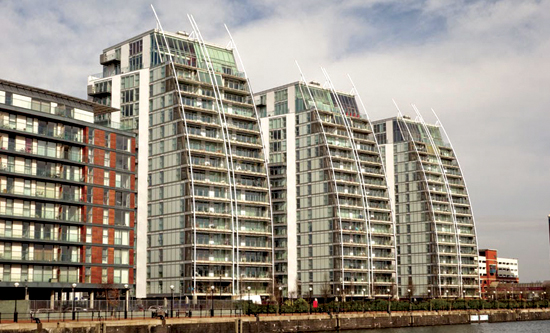
Salford, one of the most deprived cities in the country, is at the frontline of Britain’s current housing crisis as it struggles with public sell-offs, demolitions and rising rents. From a high of some 25,000 properties in the 1970s, Salford’s last remaining council houses were surrendered to private hands in a deal with Salix Homes in early 2015. This move, at a time of unprecedented housing demand, escalating rents, and falling incomes is seen by many as further proof of the abandonment of working class communities by Salford City’s Labour-run council.
With all social housing in the city now firmly within the control of housing associations – which function in essence as private providers – there is increasing anxiety for many tenants. Indeed, these providers continue to rewrite the definition of social housing to reflect changing priorities within the sector. For example, City West Housing Trust, Salford’s largest provider of social housing, has indicated that it intends to move away from its social housing commitment as it seeks to ‘maximise returns’. Salix Homes has stated that it is to ‘work to change the view that social housing is a home for life towards being a resource for a particular time’, signalling the end of secure tenancies. Of course, there is little financial incentive for them in offering concessionary rents in a period of high-return private markets. Instead, housing associations are concentrating on the more profitable area of ‘affordable rent’ which can be as much as 40% above social rent.
All of this comes as Salford struggles with extraordinary demand for housing. The council stated earlier this year that there were currently 38 applicants for each affordable home, in addition to a housing waiting list which had surpassed 14,000. The council’s primary response has been to simply amend housing eligibility criteria, thus eliminating almost half of these applicants. Yet even this brazen attempt to skew the figures has been carried with the admission that ‘most applicants have little chance of ever being rehomed’.
In addition to the general lack of homes available is the ongoing dismantling of social housing to make way for private development. This is evident in areas such as Pendleton, Higher Broughton and Langworthy, where whole estates are being cleared to accommodate the city’s ever-growing buy-to-let market. The complicity of the city council in what the Salford Star describes as ‘the assassination of communities’ is compounded by the fact that a great many of these projects are being backed with public money.
The much-heralded Greater Manchester Devolution deal included a promise of a £300m investment pot to build 15,000 badly needed homes. However, this fund has been squandered on huge loans and generous incentives to some of the region’s wealthiest private developers. Fred Done FICM Ltd received £17.3m for its development at Black Friars, Trinity. This loan covered much of the build cost despite the Done brothers being worth an estimated £950m. WB Developments Ltd also managed to acquire a cool £42m towards the development at Wilburn Street Basin; Rawlinson Developments Ltd, having claimed neither they, nor site owner Peel Holdings Ltd, could find the funds to complete construction at the highly controversial Pomona site, successfully negotiated for £10.3m. Yet out of all this publicly-backed development, not one affordable property will be created. Developers have instead sought to simply cash in on the rise in land value in and around Media City and the Manchester border. The lucrative buy-to-let market is what has fuelled such frenzied construction, with the council enticed by the prospect of a new, more affluent demographic.
Salford is already bearing the brunt of savage government austerity policies that will inflict further cuts of nearly £42m over the next three years. Rather than resist this attack, the Labour council has chosen to comply with the cuts. Indeed, former Labour Mayor of Salford, Ian Stewart, is widely perceived as having been complicit in much of the damage inflicted on Salford’s public services. His successor, Paul Dennett, was elected on an anti-austerity ticket. However, as the Salford Star reported in November 2016, there are accusations of hypocrisy over his involvement with the Greater Manchester Pension Fund (GMPF). Whilst speaking to The Manchester Evening News about his disgust at the levels of homelessness in the city it was revealed that GMPF had been pursuing evictions as it battled with homeless people who had sought refuge in its empty buildings in the city.
When the Overall Benefit Cap comes into force this winter, the crisis gripping cities such as Salford will become a full-blown emergency. Two-thirds of social housing tenants in Salford are already in rent arrears; thousands of families will be plunged further into destitution. Salford City Council’s programme of publicly-funded ‘regeneration’ has been little more than a cash bonanza for private developers. For ‘regeneration’ is little more than a euphemism for the social cleansing of the working classes, so that while millions of pounds of public money are used to create a façade of prosperity, poverty is swept to the farthest fringes of the city.
Paul Searle
Fight Racism! Fight Imperialism! 254 December 2016/January 2017




